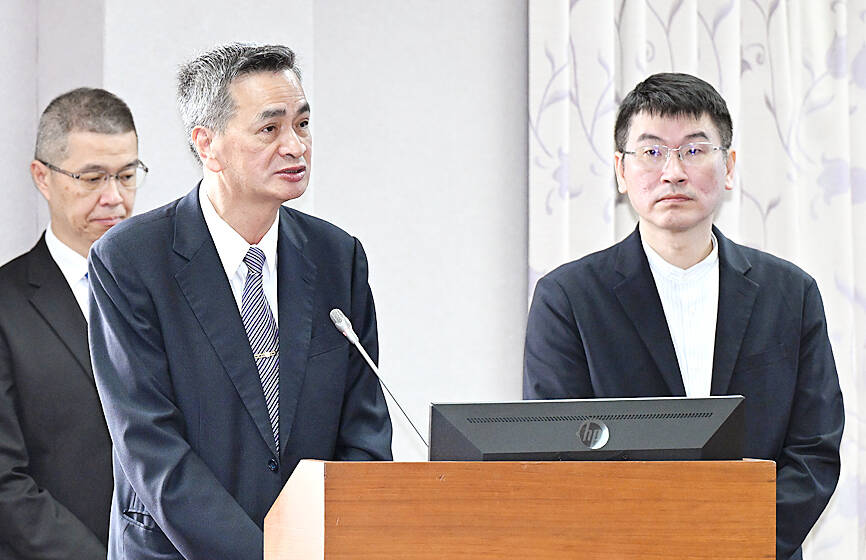More than 10,000 naturalized Taiwanese citizens from China did not provide proof that they renounced their Chinese citizenship as the law stipulates, the National Immigration Agency (NIA) told lawmakers yesterday.
NIA officials made the remarks a day after the agency said in a news release that a minority of Chinese-born naturalized citizens had received warnings over their failure to submit documentation proving that they do not have dual citizenship.
Democratic Progressive Party (DPP) Legislator Chuang Jui-hsiung (莊瑞雄) during a legislative session asked whether government actions had been motivated by the deportation of three Chinese-born influencers over the past few weeks who made public statements supporting China using force to invade Taiwan.

Photo: Liao Cheng-hui, Taipei Times
He also asked officials the number of Chinese immigrants holding citizenship in Taiwan who might be in breach of the ban on dual citizenship stipulated by the Act Governing Relations Between the People of the Taiwan Area and the Mainland Area (臺灣地區與大陸地區人民關係條例).
The NIA has no political motive for the notices, as officials have been serving them to naturalized citizens not in compliance with the law since before the controversy regarding the three influencers, NIA Deputy Director-General Chen Chen-cheng (陳建成) said.
In 2004, Taiwan promulgated amendments to the law that require naturalized citizens born in China to legally renounce their Chinese citizenship, Chen said.
The number of Chinese immigrants not in compliance with the amendments is a minority compared with the total number of 140,000, he said, adding that the NIA revoked the citizenship of 676 Chinese immigrants.
Most immigrants in breach of that law failed to provide documentation due to paperwork issues or health problems related to the COVID-19 pandemic, he said.
The amendments apply to people who obtained citizenship via marriage before 2004, Mainland Affairs Council (MAC) Deputy Minister Liang Wen-chieh (梁文傑) said.
The MAC has received complaints from Chinese spouses, including reasonable ones that officials are helping to resolve, he said.
Separately, DPP caucus chief executive Rosalia Wu (吳思瑤) said party lawmakers support government actions insofar as they follow the law.
Practical difficulties in the law’s implementation should be negotiated, she said.
DPP Legislator Huang Jie (黃捷) cited the act as saying that Chinese nationals who obtained Taiwanese citizenship should have renounced their citizenship and household registration in China within six months of the law’s promulgation.
The authorities should protect the lawful rights of immigrants who had lost their documents or could not realistically be expected to return to China to obtain their papers, she said.
Chinese Nationalist Party (KMT) caucus whip Fu Kun-chi (傅?萁) said enforcing immigration offenses that might have been committed 20 years ago past their statute of limitations is a violation of human rights.
The government should work on dealing with a looming global economic depression, not finding domestic enemies, he added.

ACTION PLAN: Taiwan would expand procurement from the US and encourage more companies to invest in the US to deepen bilateral cooperation, Lai said The government would not impose reciprocal tariffs in retaliation against US levies, President William Lai (賴清德) said yesterday, as he announced five strategies to address the issue, including pledging to increase Taiwanese companies’ investments in the US. Lai has in the past few days met with administrative and national security officials, as well as representatives from various industries, to explore countermeasures after US President Donald Trump on Wednesday last week announced a 32 percent duty on Taiwanese imports. In a video released yesterday evening, Lai said that Taiwan would not retaliate against the US with higher tariffs and Taiwanese companies’ commitments to

Intelligence agents have recorded 510,000 instances of “controversial information” being spread online by the Chinese Communist Party (CCP) so far this year, the National Security Bureau (NSB) said in a report yesterday, as it warned of artificial intelligence (AI) being employed to generate destabilizing misinformation. The bureau submitted a written report to the Legislative Yuan in preparation for National Security Bureau Director-General Tsai Ming-yen’s (蔡明彥) appearance before the Foreign Affairs and National Defense Committee today. The CCP has been using cognitive warfare to divide Taiwanese society by commenting on controversial issues such as Taiwan Semiconductor Manufacturing Co’s (TSMC, 台積電) investments in the

HELPING HAND: The steering committee of the National Stabilization Fund is expected to hold a meeting to discuss how and when to utilize the fund to help buffer the sell-off The TAIEX plunged 2,065.87 points, or 9.7 percent, to close at 19,232.35 yesterday, the highest single-day percentage loss on record, as investors braced for US President Donald Trump’s tariffs after an extended holiday weekend. Amid the pessimistic atmosphere, 945 listed companies led by large-cap stocks — including Taiwan Semiconductor Manufacturing Co (TSMC, 台積電), Hon Hai Precision Industry Co (鴻海精密) and Largan Precision Co (大立光) — fell by the daily maximum of 10 percent at the close, Taiwan Stock Exchange data showed. The number of listed companies ending limit-down set a new record, the exchange said. The TAIEX plunged by daily maxiumu in just

‘COMPREHENSIVE PLAN’: Lin Chia-lung said that the government was ready to talk about a variety of issues, including investment in and purchases from the US The National Stabilization Fund (NSF) yesterday announced that it would step in to staunch stock market losses for the ninth time in the nation’s history. An NSF board meeting, originally scheduled for Monday next week, was moved to yesterday after stocks plummeted in the wake of US President Donald Trump’s announcement of 32 percent tariffs on Taiwan on Wednesday last week. Board members voted to support the stock market with the NT$500 billion (US$15.15 billion) fund, with injections of funds to begin as soon as today. The NSF in 2000 injected NT$120 billion to stabilize stocks, the most ever. The lowest amount it